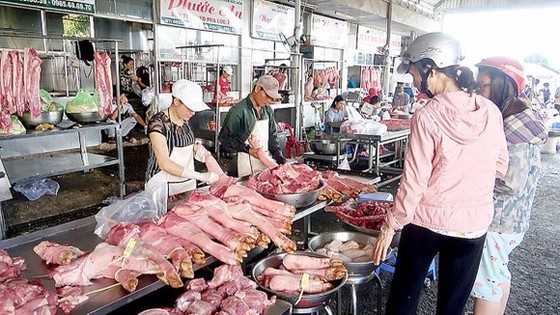 At the seminar
At the seminar
The Ministry of Industry and Trade and Industry and Trade Magazine yesterday in Hanoi held a seminar on ‘Solutions to develop a safe food distribution system and manage a food safe market’.
According to the Ministry of Industry and Trade, the Prime Minister issued Directive No. 17 requesting to strengthen the responsibility of state management of food safety on April 13, 2020. The Ministry of Industry and Trade was urged to develop a safe food distribution system in addition to food safety market management.
After two years, local administrations in 62/63 provinces and cities have spent their state budget piloting the construction of 66 markets that sell food products meeting food safety. After initial success in building such markets, many localities such as Thanh Hoa, Tien Giang, Vinh Long, and Ho Chi Minh City started replicating the market model. However, there have been hiccups such as policies, resources, and solutions for long-term maintenance along with the replication of the market model.
 Ms. Le Viet Nga, Deputy Director of the Department of Domestic Market at the seminar
Ms. Le Viet Nga, Deputy Director of the Department of Domestic Market at the seminar
According to Ms. Le Viet Nga, Deputy Director of the Department of Domestic Market under the Ministry of Industry and Trade, the country has 8,549 traditional markets, but 80 percent of them are in rural areas, while 86 percent are third-class markets (or small-scale residential markets where infrastructure conditions, facilities are still very poor and capital to invest in traditional markets is also very difficult to attract) and 75 percent of food is sold in traditional markets.
Regarding food safety, Ms. Le Viet Nga said that the management is facing a lot of difficulties because most small traders get their goods from wholesale markets or from self-sufficient production areas of localities and companies; therefore, traceability for this group of goods bumped into difficulties.
According to the Government's assignment in Decree 15, the Ministry of Agriculture and Rural Development is responsible for food safety at wholesale markets, said Ms. Nga. As a result, in order to monitor food safety, the Ministry of Industry and Trade and the Ministry of Agriculture and Rural Development need to strengthen cooperation.
In order to enhance food safety at small markets in localities, Deputy Director Nga said that it is also necessary to train 2 million small traders in traditional markets.
 8,000 traditional markets will be converted into places to sell quality commodities
8,000 traditional markets will be converted into places to sell quality commodities
According to Mr. Nguyen Xuan Anh Tuan, Deputy Director of the Livestock Competitiveness and Food Safety Project (LIFSAP), in order to improve food safety and hygiene at the market, a supply chain from production to slaughter to market ought to be set up after all.
Mr. Hoang Minh Luan, Deputy General Director of Hai An Market Cooperative cum a member of the Executive Committee of the Vietnam Market Development Association, affirmed that it is a difficult trip to supply a product in the supply chain from farm to slaughterhouses, to small business households and to consumers.
According to him, for successful replication of the model of a safe food market in all localities, markets must have wastewater treatment, waste collection, and display sections of commodities to ensure hygiene, and at the same time, it is also necessary to ensure hygiene on the whole chain.
In terms of policies, to strengthen food safety management at markets, the Ministry of Industry and Trade had developed a draft national standard on food trading markets which was approved to be issued by the Ministry of Science and Technology in 2017. It is the standard TCVN 11856: 2017 on food trading markets.
According to Ms. Nga, in the past, local administrations in extremely difficult areas were allowed to spend their state budget investing in markets while governments in other areas were almost not allowed to use the state budget for market infrastructure. However, by 2020, the National Assembly's resolution has allowed the use of the State budget to invest in wholesale markets and small markets.
Currently, the Ministry of Industry and Trade has been assigned by the Government to amend the decree on market investment and development, including the conversion of the right to exploit public property in traditional markets.
The Ministry of Industry and Trade will work with the Ministry of Finance and the Department of Public Asset Management under the Ministry of Finance, on the effective conversion and efficient exploitation of state assets while ensuring social security for residents.
People with low or middle incomes and small traders in disadvantaged areas, people selling goods for a living usually buy and sell commodities in a traditional market. Therefore, local governments should take heed of these people’s livelihoods while building traditional markets into places for selling standard foodstuffs.
She said that the draft amended decree will be submitted to the Prime Minister right next month and the Ministry of Industry and Trade hopes to receive people's advocacy and the Government’s approval so that the draft will receive financial support including from the state, local budgets and enterprises and cooperatives in the process of socializing the construction, management, and exploitation of traditional markets, which currently account for high rate in the country’s total retail sales of food products.
























